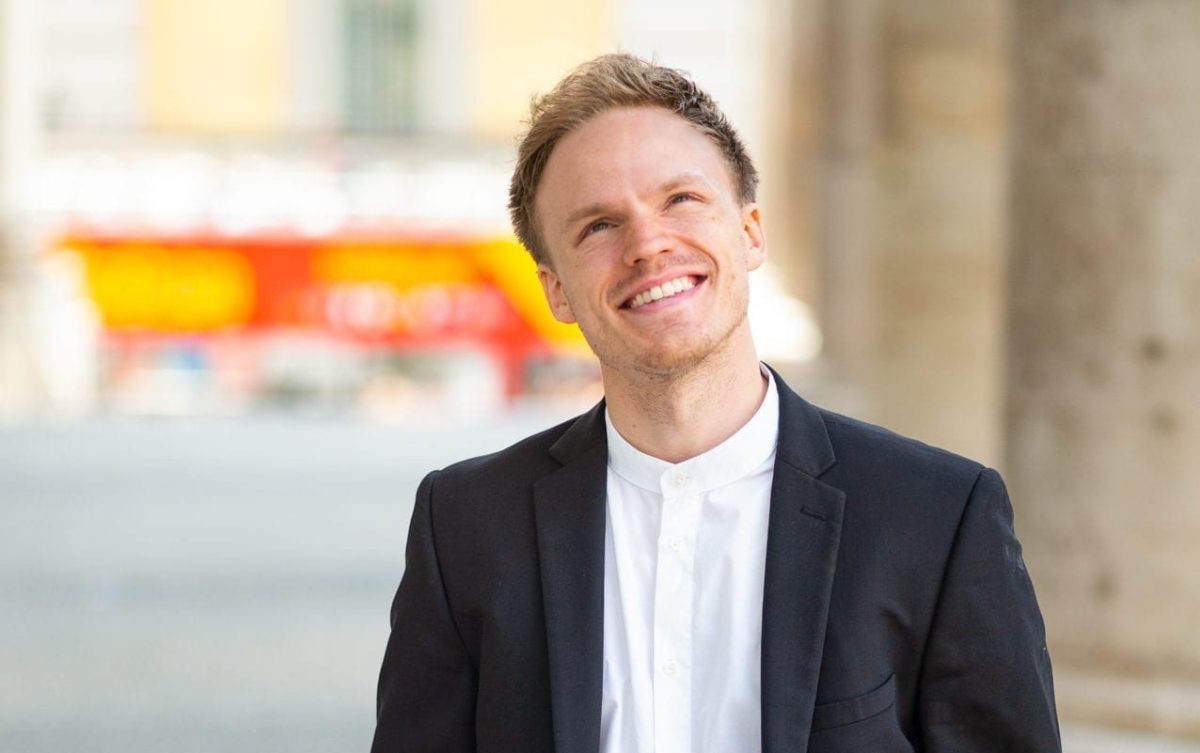The Adelaide audience turned out in full this week to hear two great musical masterworks – Beethoven’s Fourth Piano Concerto and Mahler’s marvellous Fourth Symphony. The Adelaide Symphony Orchestra (ASO) did not disappoint under the enthusiastic baton of British conductor Finnegan Downie Dear, making his debut appearance here.
The concert opened with another debut – the ASO’s premiere performance of a little-known gem, Rissolty Rossolty by US composer Ruth Crawford Seeger, a noted matriarch of the US folk movement but a modernist at heart. This is a charming piece, just three minutes long, that weaves together familiar folk tunes with something altogether more complex and deeply layered. It was first performed in 1940, a time when the composer was already recognised for her avant-garde approach. The flutes and horns and strings all come together to a climax and then the piece finishes with just the hint of a last word.
Rather unusually, Downie Dear then took up the microphone and shared some insights into the piece, saying the composer had wanted to bring music back to its ‘pure simplicity’. He explained how the different folk melodies played out in the work, saying it is really ‘extraordinarily complex and virtuosic’. And so, with our ears now more attuned to the music, the ASO played it once again. This was a very effective way of enhancing the audience’s appreciation of a piece they had probably never heard before, and certainly not in live performance.
Acclaimed British pianist Steven Osborne then joined the orchestra on stage for Beethoven’s Piano Concerto No. 4. Osborne took the lead immediately with the solo piano playing the fragile opening notes and enticing the orchestra to join in. This was quite a radical musical gesture when the work premiered in Vienna in 1807; traditionally the orchestra introduces the soloist.
Osborne and Downie Dear displayed superb synergy as they reached the climax at the end of the first ‘allegro moderato’ movement. The second and third movements segued together seamlessly, building on the considered discourse between the piano and the orchestra. Osborne played with a wonderful touch, delicate and disciplined but playful too, especially in the delightful ‘rondo’ to close the work. The appreciative audience was rewarded with a brief encore of a more soulful nature before they went happily into interval.
And then it was the Mahler, always an audience favourite. This richly textured symphony depicts our journey to the celestial afterlife. Along the way the music evokes a magical lived experience – from sleigh bells to the sounds of street musicians – and a rich inner life, with moments of aching tenderness. It opens with bells and flutes, horns and trumpets, all evoking images of an alpine Christmas or a busy marketplace. The opening was only marred by a telephone ringing in the dress circle. (Perhaps it’s timely to reintroduce the “please turn off your mobile phones” announcement.)
Downie Dear was in his element here, conducting a piece he knows well. Back in 2020 he won Bamberger Symphoniker’s prestigious Mahler Competition for conducting. The Mahler 4 was one of the required pieces that year, and Downie Dear triumphed in a field of over 300 candidates.
This masterwork is really a meditation on life and death and the afterlife. It is based on a collection of traditional German folk poetry known as Des Knaben Wunderhorn (The Youth’s Magic Horn) and set to music by Mahler. The words are sung in the final movement and, for this, soprano Olivia Warburton joined the orchestra in her first appearance with the ASO. She has a wide repertoire including contemporary, opera and classical music, and sings with a maturity beyond her years.
In the superb second movement, popular ASO concertmaster Kate Suthers swapped between two violins, one tuned much higher than usual. The high notes in the score represent the spectre of a devilish fiddler and hint at the fate to come.
Mahler gave each of the four movements rather idiosyncratic descriptors that do belie the work’s drama and passion: the first is to be played ‘deliberately – really unhurried’, the second ‘in a leisurely tempo, without haste’, the third ‘peacefully’ and the delightful fourth, exploring a child’s vision of heaven, is to be ‘very homely and comfortable’. But for all those cosy descriptors, this is still a genuine Mahler Symphony with raging basses and rampaging timpani.
Read: Music review: Romance, QPAC
The work concludes with the words ‘No music on Earth can compare with ours. Cecilia and her relations are excellent court musicians! The angelic voices lift our spirits and all things awaken to joy!’ And so we all agreed, heading home with our spirits lifted and our hearts full of joy!
Paradise
The Adelaide Symphony Orchestra with conductor Finnegan Downie Dear
Adelaide Town Hall
Soloists: Steven Osborne, Piano and Olivia Warburton, Soprano
Paradise played for two performances only on 25-26 August 2023.





